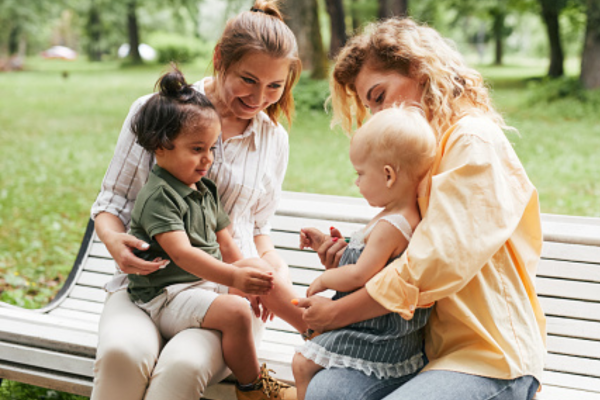Each May on Birth Mother’s Day, talk to your child about how much you honor and respect their birth parents. Here are some ways you can honor birth parents together.
As an adoptive parent, you understand the significant role your child’s birth parents have played in your and your family’s lives. After all, their loving and courageous decision led your child to you. Birth Mother’s Day presents an especially good opportunity to recognize and discuss your child’s birth parents.
Three of The Cradle’s experienced counselors — Pam Tancredi, LCSW, co-director of Adoption and Family Support; Ashley Akiyama-Elston, LCSW, helpline coordinator; and Meg Hopps, LCSW, expectant parent counselor — offer suggestions for respectfully recognizing birth parents on Birth Mother’s Day and throughout the year, keeping in mind the complicated feelings such recognition can bring up.
What Is Birth Mother’s Day?
Birth Mother’s Day in the U.S. takes place each year on the Saturday before Mother’s Day in May. It was originally founded in 1990 by a group of birth mothers in Seattle who wanted to honor and support each other. In the years since, the day has evolved to more broadly recognize birth mothers who chose to place their children for adoption. Though the day initially focused on mothers, some families honor birth parents more broadly on Birth Mother’s Day. Families who are not in contact with birth parents may have different ways of approaching Birth Mother’s Day than those with open adoptions.
“It’s [about] honoring birth mothers in the same way that mothers are honored on Mother’s Day,” Hopps says. “It’s acknowledging that they are the ones who gave birth to children and honoring them, regardless of what stage they’re in, when they placed and what type of relationship they have with their birth child.”
Navigating Complex Feelings on Birth Mother’s Day
Birth Mother’s Day will likely bring up complicated feelings for everyone involved, and it is often a bittersweet day for birth parents. It’s normal to feel both happiness and grief, and to hold these different feelings simultaneously. “[Birth parents] can feel they made the best decision — they love seeing their child grow, and they love the adoptive family they’ve chosen — but they can also be sad,” Hopps says.
Tancredi explains that many adoptive parents may not be prepared for their own complex range of emotions around this time as well. “The idea that kids are thinking about this ‘other mother’ or other set of parents might be upsetting to the parents that are raising them,” she says. “[But for children] it’s normal to be thinking about all of that, and it doesn’t take away from the relationship you have with your child.”
How Can You Honor Birth Parents on Birth Mother’s Day?
Because every adoption story is different, the ways that families recognize Birth Mother’s Day will also differ. What you choose to do may be influenced by whether your child has contact with their birth parents.
1. Talk to Your Child About Their Birth Parents
Talking about your child’s birth parents is a great way to honor them on Birth Mother’s Day. For example, you can tell your child their birth story, incorporating photos of their birth parents if you have them. Make it a safe space for your child to ask questions. Regardless of your child’s current relationship with their birth parents, the goal is to be open and honest. “Focus on positives when you can, and sit with the unknowns if you have to,” Hopps says.
Children may ask questions you don’t have the answers to, and that’s okay. Acknowledging those questions and sitting with your child through the difficult space of not knowing allows them to explore complicated emotions in a safe and supported way.
2. Do Something That Helps Your Child Feel Connected to Their Birth Parents
In most open adoptions, agencies provide background information about a child’s birth parents. This may include their favorite color, a food they love, music that means something to them or other personal details. This information can help your child feel more connected to their birth parents by experiencing some of their favorite things on Birth Mother’s Day.
Some ideas:
- Make or order a meal that is special to them.
- Engage in one of their hobbies.
- Watch or play their favorite sport.
- Listen to music they love.
- Watch one of their favorite movies.
You can do these things even if your child is not currently in touch with their birth parents.
3. Make Something for Their Birth Parents
Many adoptive families like to put together personal updates to send birth parents on Birth Mother’s Day. This can take the form of a simple card, a letter or a small scrapbook. Hopps suggests including any major milestones or things that happened at school during the past year, as well as materials like photos, drawings, schoolwork or something else your child has made.
Akiyama-Elston adds that you can do something like this even if your family isn’t currently in contact with your child’s birth parents. “One thing adoptive families can do with their child, if they’re old enough, is put together an update to send to the [adoption] agency,” she says. “That way, if the birth parent is ever ready for contact and reaches out, [the agency] would have all these updates waiting for them.”
4. Plant a Tree or Flowers
Planting a tree or flowers in honor of your child’s birth parents is a beautiful way to observe Birth Mother’s Day together, especially if your child is still relatively young or they don’t currently have contact with their birth parents. “If there isn’t [the option for] a visit, you could plant a flower, a tree, a plant — something you can look at and actually tangibly see,” Hopps says.
You can let your child choose the type of tree or flowers from a few options you have selected, and if you plant perennial flowers, they can look forward to them coming back each year. Decide where to plant your tree or flowers together, and let your child help with the planting process. Water and care for the plant together and note how it has grown each year, using this as an opportunity to remember and honor your child’s birth parents. You may also consider starting a tradition of planting something new each year on Birth Mother’s Day.
5. Plan to Get Together Virtually or in Person
Some adoptive families like to plan time together with birth parents on Birth Mother’s Day. This can be an in-person visit, a video call or a phone call. This may not work for every family, and it’s completely normal if children or birth parents are not ready for this type of interaction.
Tancredi offers a reminder that while Birth Mother’s Day is a great opportunity for some of the above activities, you don’t have to wait until then to honor their birth parents. “Things like holding [your child’s] birth parents in high regard, having these kinds of conversations — these are things to be thinking about and conversations to be having all year round,” she says.
If you would like help navigating relationships with birth parents or difficult conversations with your child, we’re here to support you with educational resources and adoption-competent counseling. Request an appointment with one of our therapists through our online form or by calling us at 847-475-5800.














